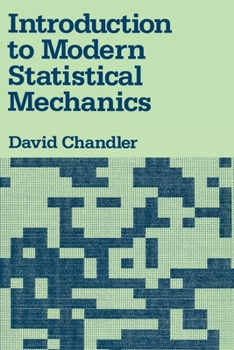Introduction to Modern Statistical Mechanics
Select Format
Select Condition 
Book Overview
Leading physical chemist David Chandler takes a new approach to statistical mechanics to provide the only introductory-level work on the modern topics of renormalization group theory, Monte Carlo simulations, time correlation functions, and liquid structure. The author provides compact summaries of the fundamentals of this branch of physics and discussions of many of its traditional elementary applications, interspersed with over 150 exercises and...
Format:Paperback
Language:English
ISBN:0195042778
ISBN13:9780195042771
Release Date:September 1987
Publisher:Oxford University Press
Length:288 Pages
Weight:0.94 lbs.
Dimensions:0.6" x 6.2" x 9.3"
Related Subjects
Chemistry Elections & Political Process Epistemology General & Reference Language Arts Mechanics Philosophy Physical & Theoretical Physical Chemistry Physics Political Parties Political Science Politics & Government Politics & Social Sciences Science Science & Math Science & Scientists Science & Technology Social Sciences TechnologyCustomer Reviews
5 ratings
Finally--it all makes sense
Published by Thriftbooks.com User , 16 years ago
After learning almost nothing in my graduate course on stat mech taught by a famous physicist, I decided I would have to teach myself Stat Mech over the summer. When I found this book, I really started to make progress. Right away I got the big picture on what statistical mechanics is all about, and that made all the difference. I was able to work my way quickly through the book, doing the problems as they came along in text and understand almost everything. I wasn't able to make it through the denser chapters at the end on nonequilibrium stat mech on my own, but the book was well worth the price and is one of my favorites. The explanations are pure gold. A few tips for the reader: 1. Do the problems as your read. The best place for the problems in a textbook is in the text itself, not at the end of the chapter. 2. Get the solutions manual I purchased the solutions manual so that I could check my solutions. It had about half the solutions and only half of them worked out in detail, but it was still very useful for getting started on some of the problems I wasn't sure how to approach. 3. Make a notation conversion chart Some of the greek letters are different than the usual notation for physics courses, so I had to make a notation conversion chart on the front inside cover and that was very helpful. 4. If you find the book too hard, use Schroeder's book as an introduction. 5. Be prepared to see a missing spot on your shelf. I'm constantly loaning this book out to people in my research group and other students.
Ever wonder why energy flows from a hot body to a cooler one?
Published by Thriftbooks.com User , 18 years ago
I used this book while taking the course for which this book was designed, Prof. Chandler's stat mech course for first year graduate students. I agree with the reviewer who wrote that this book avoids a lot of filler that can distort the main thrust of the material at hand. I disagree with the reviewer who wrote that this is not the book for a beginner. I used this book having studied undergrad p-chem but essentially no stat mech. Being a concise text, one must read carefully to extract the point of each paragraph. I sometimes found myself re-reading certain sections a few times in order to understand them. The abundant prose should be evidence that the author is trying to provide a physical picture to improve the scientific intuition of the reader. This doesn't mean the book isn't for a beginner. It just means what you should already know: you will not learn stat mech by skimming any text just once with a pint of beer in your hand. I constantly return to this book for review of thermo and stat mech concepts. For my grad qualifying exams I mostly used McQuarrie for general p-chem overview, but switched right back to IMSM for thermo and stat mech review. If you're looking for a reference book with every possible stat mech problem worked out to help with your problem sets, this is not it. If you want to understand stat mech this book is the first step.
Good reference book
Published by Thriftbooks.com User , 23 years ago
A clear, concise explanation of statistical mechanics. Some people may complain about the "concise" part--in many cases, mathematical exercises are left as exercises to the student. However, this practice allows the reader to really understand the material by doing, not just reading. I learned stat mech for the first time from this book, and only examined other texts (mcquarrie or hill) afterwards.
Caltech Graduate Student
Published by Thriftbooks.com User , 24 years ago
This was a great book. It covered the important material and left out all of the extra garbage that most books carry on for pages about. The presentation was done using clear mathematics and modern, easily followed notation. The book is short making it practical to actually read the entire book if you are extremely busy. We used the book in conjunction with Hill. I don't recommend Hill because it is hard to follow.
Only modern stat mech book
Published by Thriftbooks.com User , 26 years ago
The best part of this book is that it is modern. You have chapters on Monte Carlo simulations, the Ising model, and more. You don't get long chapters on the partition function of an ideal gas, for example. The bad part about this book is that it is not immediately transparent if you're reading stat mech for the first time. I like it more the more I know about stat mech, but it's not a good beginner's book, and I think it's better to have another book with it - maybe Hill or McQuarrie - since it's not really that long either. Still, recommended (get the soln. manual too) with these caveats.





